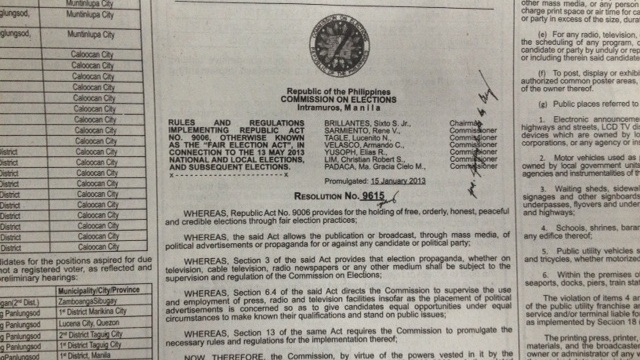SUMMARY
This is AI generated summarization, which may have errors. For context, always refer to the full article.

MANILA, Philippines – For the May 13 elections, the Commission on Elections (Comelec) doesn’t want television, radio, and the Internet bombarded with campaign ads. It has revised old rules to impose huge cuts on candidates’ advertising minutes.
Based on a new resolution published in two newspapers Tuesday, January 16, national candidates – those running for the senatorial and party-list races – may only run a total of 120 minutes TV advertising in all networks. For radio, the limit is 180 minutes.
Comelec Resolution 9615 reads: “Not more than an aggregate total or 120 minutes of television advertising, whether appearing on national, regional, or local, free or cable television, and 180 minutes of radio advertising, whether airing on national, regional, or local radio, whether by purchase or donation.”
The Comelec will begin counting the minutes on February 12, the start of the official campaign period, up to May 11.
Comelec reverts to the original interpretation of the advertising limits under Republic Act 9006, “The Fair Election Act.” Passed in 2001, the law lifted the political advertising ban in the Philippines but limited TV advertising to 120 minutes throughout the campaign period. But the law is not categorical on whether the the limit applied per network or across all TV stations in the country.
In the 2001 elections, the limit applied to all stations.
But in the 2004 elections, the poll body under Comelec chairman Benjamin Abalos Jr, declared that the 120-minute limit applied to each TV network.
This allowed moneyed candidates to maximize the campaign tool, which have been proven as an effective vote-getter especially in senatorial elections.
Abalos’ 2004 interpretation was followed in the succeeding 2007 and 2010 elections.
The new interpretation is the one poll watchdogs have always been pushing for. “It was the intention of the law,” said advertiser and electoral reform advocate Yolanda Ong.
Changing TV viewership
The new rules will have huge impact on TV and radio consumers.
Based on Rappler computations, the old interpretation allows each candidate about five 15-seconder ads per network every day during the 90-day official campaign period.
The new interpretation allows them two 15-seconder ads per day per network – assuming candidates spread out their minutes evenly in the 3 major networks, ABS-CBN, GMA-7, TV5.
The new rules will impact candidates’ spending too.
Administration senatorial candidate Juan Edgardo “Sonny” Angara welcomed the new limits.
“Personally, that’s acceptable given the high cost of advertising during the campaign. Some of the wealthier candidates will probably not be happy because it takes away their advantage in a sense,” Angara said.
Angara said televised debates will help voters get their information on the candidates. “One way to supplement the minutes and inform the public is for the networks to have more televised debates open to all candidates and I’m happy that some networks both TV and radio plan to do this. This woud help the public know their candidates better,” he added.
What punishment?
How Comelec will enforce the new rules remains to be seen.
Previous elections have shown how candidates violated with impunity the already generous advertising limits.
In the 2010 presidential campaign, President Benigno Aquino III and and rival Senator Manuel Villar both exceeded their 120-minute allowable time as early as two months before the elections.
It was Comelec spokesperson James Jimenez himself who announced back then that Aquino had used 291.5 minutes in ABS-CBN alone for the period between February 9 to March 12.
There are various forms of punishment under the law for these kinds of election offenses – imprisonment, disqualification to hold public office, and deprivation of the right of suffrage among othres.
No candidate has ever been punished, however.
Previous elections have shown various ways to go around the already generous limits, too. Comelec chairman Sixto Brillantes Jr said they are also putting a stop to them.
Political parties are also allowed 120-minute in TV advertising. Presidential and senatorial candidates, for example, have appeared in previous elections with party-list candidates endorsing them in TV ads.
These minutes were previously charged to the party-list group. Brillantes said, this time, it will also be charged to candidates’ minutes. – Rappler.com
More of Rappler’s 2013 election coverage, #PHVote 2013:
Add a comment
How does this make you feel?
There are no comments yet. Add your comment to start the conversation.